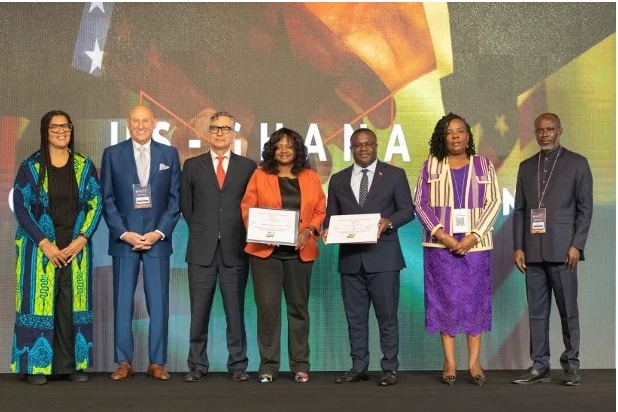
During the US-Africa Nuclear Energy Summit (USANES) in Nairobi, Kenya, Nuclear Power Ghana and US nuclear technology project developer Regnum Technology Group reached an agreement to deploy a single NuScale VOYGR-12 small modular reactor (SMR) plant in Ghana. The two companies plan to form a subsidiary company in the near future to own and operate Africa’s first commercial advanced light-water SMR.
“Signing this agreement will position Ghana as a leader in the deployment of small modular reactors in Africa, catalysing economic development and job creation in the region,” said US Under Secretary for Arms Control and International Security Bonnie Jenkins. “We are excited by the promise of these technologies in building a more sustainable future.”
“Ghana and many other African countries are pursuing nuclear energy to achieve their economic development, energy security, and decarbonization goals,” said Deputy Assistant Secretary for International Cooperation Aleshia Duncan. “It’s imperative that the United States remain a strong and engaged partner, offering technical expertise and resources to ensure the successful deployment of nuclear energy across the continent.”
The US Department of Energy (DOE) has provided more than $579m since 2014 to support the design and licensing of US NuScale’s VOYGR SMR power plant. NuScale’s technology is the only SMR to receive design certification from the US Nuclear Regulatory Commission. Although the NRC’s 2023 certification was based on an earlier 50 MWe version of the VOYGR reactor, NuScale is seeking to increase the power for each module to 77 MWe, which is currently under review with the NRC.
The second annual USANES conference included a week-long series of events hosted by the US DOE. The first USANES was held in Ghana in November 2023 and the next one is planned for July 2025 in Rwanda with a special focus on SMRs.
The US has been lobbying hard for nuclear business in Africa with significant efforts being made in Ghana. In March 2022 Ghana joined the US Department of State’s Foundational Infrastructure for Responsible Use of Small Modular Reactor Technology (FIRST) programme, which was launched in April 2021. “As the US government works with the government of Ghana to lay a strong foundation for a thriving civil nuclear energy sector, US companies are eager to support that ambition every step of the way,” said US Deputy Assistant Secretary Camille Richardson at the time.
In May 2024, US Principal Deputy Assistant Secretary of State for International Security & Nonproliferation, Ann Ganzer, announced new civil nuclear cooperation initiative to support Ghana’s nuclear power development, including establishing Ghana as a SMR regional hub. Earlier in August, US DOE and Ghana Atomic Energy Commission’s (GAEC’s) Nuclear Power Institute (NPI) launched Africa’s first regional Clean Energy Training Centre. DOE said the centre will serve as a regional training hub for Ghana and other like-minded African countries considering nuclear energy as part of their economic development, energy security, and decarbonisation goals.
In June, Robert Sogbadji, Ghana’s deputy director for power in charge of nuclear and alternative energy said Ghana has identified two sites to accommodate its first NPP and would identify a vendor country and technology by the end the year. Russia, China, France, the US and South Korea are the leading contenders, he said, noting that Ghana’s nuclear power programme is being implemented with guidance from the International Atomic Energy Agency using its Milestone’s Approach.
He explained that the Cabinet and the President will decide the vendor country based on advice from the Ministry of Energy. Due to the size of the project funding, the project implementation also has to go to Parliament for approval. Earlier he had identified possible suppliers as France’s EDF, US-based NuScale Power and Regnum Technology Group, China National Nuclear Corporation (CNNC), South Korea’s Kepco and its subsidiary Korea Hydro & Nuclear Power (KHNP) as well as Russia’s Rosatom. “It can be one vendor or two nations; it will depend on the financial model and the technical details,” he said, adding that Ghana aims to add about 1,000 MWe of power from nuclear to its electricity mix by 2034. He said it would prefer a “build, own, operate and transfer” arrangement with room for local equity holding.
In 2022, Russia and Ghana agreed to establish a Joint Working Group to coordinate and exchange information regarding Russian technological solutions for SMRs during a seminar on SMR technology in Accra organised within the framework of nuclear energy cooperation between Russia and Ghana.
In April 2024, Nuclear Power Ghana and CNNC Overseas Limited signed a cooperation and framework agreement on the margins of the 26th World Energy Congress in Rotterdam for the construction of a HPR-1000 (Hualong One) Nuclear Power Project and the upgrade of Ghana’s grid.
Ghana started its nuclear energy development in the 1960s with the Soviet Union helping to establish the Ghana Atomic Energy Commission to train human resource capacity for the Ghana nuclear power programme. Ghana currently operates a Chinese-designed Miniature Neutron Source Reactor (MNSR), which it uses for neutron activation analysis at research institutions, universities and hospitals. The Ghana Research Reactor-1, a 30kW Chinese designed, which was commissioned in March 1995 and converted to run on low-enriched uranium fuel in 2017.
Ghana restructured its nuclear programme in 2008 to meet the expected increase in energy demand. The Ghana Nuclear Power Programme Organisation was established in 2012 to oversee the preparation of the roadmap and implement activities for the inclusion of nuclear energy into the energy mix. The nuclear regulatory authority of Ghana was established in 2016 and Nuclear Power Ghana was established in 2018 as the Owner/Operator of Ghana’s first proposed NPP.